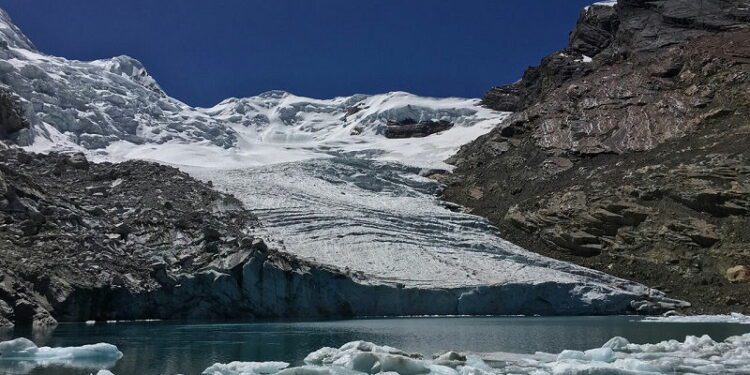Queshque Glacier in the Peruvian Andes. Credit: Emilio Mateo/ Aspen Global Change Institute.
Glaciers around the world are shrinking as the Earth gets warmer, but scientists have debated just how severe this shrinkage is compared to natural cycles of glacier growth and retreat that have occurred since the end of the last Ice Age about 12,000 years ago.
A new study focusing on glaciers in the high Andes mountains of Colombia, Peru, and Bolivia reveals that the current retreat of these tropical glaciers is unlike anything seen in the last 11,700 years.
This period marks the beginning of a warm era known as the Holocene, during which humans began to develop agriculture and civilizations flourished.
The study, led by Andrew Gorin, a graduate student from the University of California, Berkeley, and published in Science, suggests that these glaciers may be smaller now than they have been in the past 125,000 years. However, the data isn’t detailed enough to confirm this beyond 12,000 years ago.
Gorin explained that the study’s methods can’t provide precise details for periods earlier than 12,000 years ago, but it’s reasonable to think that these glaciers are currently smaller than they’ve been since the last interglacial period, around 125,000 years ago.
This was a warm period before the most recent glacial era began 120,000 years ago.
The study’s findings are especially significant because 99% of all tropical glaciers are found in the Andes.
These glaciers are highly sensitive to rising global temperatures, which have a more significant impact on their size than the small seasonal temperature changes typical around the equator.
This makes tropical glaciers a clear indicator of the effects of climate change.
The results of this study suggest that glaciers worldwide might be retreating much faster than previously thought, potentially decades ahead of earlier predictions. Jeremy Shakun, a paleoclimatologist and leader of the study, pointed out that modern glacier retreat is mostly due to rising temperatures.
This means that tropical regions may have already warmed beyond their typical Holocene temperatures and into a new era called the Anthropocene, where human activity is the main driver of global changes, including climate change.
Shakun described this discovery as a “canary in the coal mine,” indicating that other glaciers around the world could be experiencing similar unprecedented retreats.
To conduct their research, the team measured the chemistry of bedrock that has only recently been exposed as the glaciers in Colombia, Peru, and Bolivia melt.
They specifically looked for two rare isotopes—beryllium-10 and carbon-14—that accumulate in rock surfaces when exposed to cosmic radiation.
These isotopes can reveal how long the bedrock has been uncovered, helping scientists understand how often glaciers were smaller than they are today.
Surprisingly, the researchers found almost no trace of these isotopes in any of the 18 bedrock samples they collected, suggesting that the glaciers have been consistently larger for thousands of years, at least until now.
Gorin considered the possibility that the glaciers might have scraped away the rock containing these isotopes, but he found this explanation unlikely.
The glaciers would have needed to remove about 10 feet of rock over 5,000 years, which is not a probable scenario.
Shakun and his team plan to release more findings soon, including studies on glaciers in southern South America. Once all the data is compiled, they hope to provide a global perspective on the current state of glacier retreat.
This research was supported by the National Science Foundation, and the team collaborated with scientists from the University of Wisconsin-Madison and Tulane University to analyze the rock samples.
Source link : http://www.bing.com/news/apiclick.aspx?ref=FexRss&aid=&tid=66b95604d64b428cb38356ed5f7925ff&url=https%3A%2F%2Fknowridge.com%2F2024%2F08%2Fscientists-reveal-tropical-glaciers-are-smaller-than-ever-before-in-11000-years%2F&c=12485730261319813697&mkt=en-us
Author :
Publish date : 2024-08-11 11:54:00
Copyright for syndicated content belongs to the linked Source.












